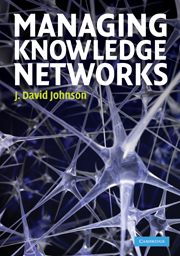Book contents
- Frontmatter
- Contents
- List of figures
- List of tables
- List of boxes
- Preface
- Acknowledgments
- 1 Introduction and overview
- Fundamentals
- Contexts
- Pragmatics
- 9 Creativity and innovation
- 10 Productivity: efficiency and effectiveness
- 11 The human side
- 12 Finding knowledge
- 13 Decision making
- 14 Summary and commentary
- References
- Index
- References
9 - Creativity and innovation
Published online by Cambridge University Press: 05 June 2012
- Frontmatter
- Contents
- List of figures
- List of tables
- List of boxes
- Preface
- Acknowledgments
- 1 Introduction and overview
- Fundamentals
- Contexts
- Pragmatics
- 9 Creativity and innovation
- 10 Productivity: efficiency and effectiveness
- 11 The human side
- 12 Finding knowledge
- 13 Decision making
- 14 Summary and commentary
- References
- Index
- References
Summary
While we will consider various knowledge transfer issues and strategies…many of them come down to finding effective ways to let people talk and listen to one another.
(Davenport and Prusak 1998, p. 88)Innovations are not only adopted, implemented, and confirmed through social relations among people; they are also created, understood, and defined socially.
(Dearing, Meyer, and Kazmierczak 1994, p. 17)…managers whose networks span structural holes have an advantage in identifying and in developing the more rewarding opportunities.
(Burt 2005, p. 235)At times knowledge can be seen as the source of organizational innovation and change – at other times, however, it can be the very constraint on that change.
(Hargadon and Fanelli 2002, p. 290)Glorification of exploration obscures the fact that most new ideas are bad ones, most changes are detrimental, and most original inventions are not worth the effort devoted to producing them.
(March 1994, p. 238)Creativity and innovation processes often determine how rapidly private and governmental organizations change to survive in an increasingly competitive world. As Schumpeter (1943) classically observed, creative destruction, replacing the old with the new, is a fundamental component of capitalist economic systems. A stagnant organization that cannot react to evolving environmental conditions will eventually find itself no longer competitive in an increasingly complex and technologically sophisticated economy. Economic prosperity increasingly depends on the development of new products and services. Innovation may be the ultimate service provided by KM organizations.
- Type
- Chapter
- Information
- Managing Knowledge Networks , pp. 169 - 195Publisher: Cambridge University PressPrint publication year: 2009



